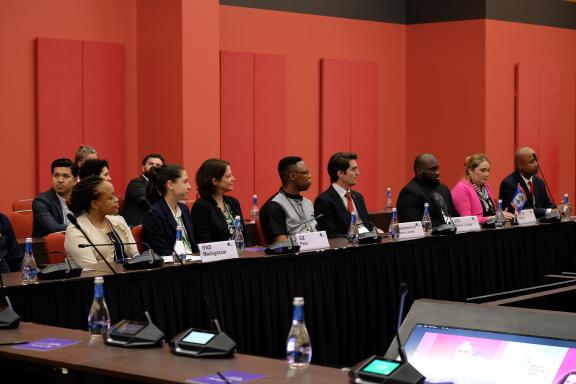Five newly approved climate projects ready for delivery on the ground
Five project agreements were signed at the Green Climate Fund’s (GCF) 38th Board meeting, which took place on 4-7 March in Kigali, Rwanda.
Eleven projects were approved at the first Board meeting of the year, totaling USD 489.8 million of GCF financing and USD 1.26 billion including co-financing. Among the 11, agreements were signed for five projects between GCF and its Accredited Entity partners at a signing ceremony on 6 March, one day after their approvals.
The five projects will increase climate resilience in some of the most climate-vulnerable countries: Belize, the Cook Islands, Madagascar, Peru, and Sierre Leone. Two of the projects are direct access, implemented by national or subnational organisations – the Cook Islands’ Ministry of Finance and Economic Management and the Caribbean Community Climate Change Centre (CCCCC).
Otherwise known as Funded Activity Agreements (FAAs), the project agreements contain conditions to be fulfilled by the AE that must be negotiated and signed by GCF and the AEs before the project can launch. The short turnaround between Board approval and legal arrangements is a result of GCF’s efforts to speed up processes to efficiently deliver projects on the ground. The Cook Islands project is also notable for being the fastest, taking less than a month from project approval to FAA signing to the first disbursement of funding.

Representatives from the Accredited Entities and governments at the hybrid signing ceremony that took place on the sidelines of GCF’s 38th Board meeting in Kigali, Rwanda.
Akamatutu’anga To Tatou Ora’anga Meitaki (ATOM): Building a healthy and resilient Cook Islands Community – one block at a time (SAP034)
Accredited Entity: Ministry of Finance and Economic Management, Cook Islands
The Cook Islands face immense health challenges due to climate change. Water and food security, safety, vector-borne diseases, and heat-related illnesses are exacerbated by climate-related natural hazards such as intense cyclones and rising sea levels, and climate-related disasters disrupt healthcare services, disproportionately affecting vulnerable groups in the population. ATOM aims to enhance the capacity of the health system and the climate resilience of health services in the Cook Islands. The project will further support approximately 30 communities and 22 health facilities and/or emergency centres in 12 inhabited islands of the 15 islands, including the 11 outer Pa Enua islands and the main island of Rarotonga.
Building the Adaptive Capacity of Sugarcane Farmers in Northern Belize (BaC-SuF) (SAP035)
Accredited Entity: Caribbean Community Climate Change Centre (CCCCC)
The sugar industry in Belize is highly vulnerable to climate change. Sugarcane farmers in northern Belize are facing financial, physical, and social risks due to erratic precipitation patterns. BaC-SuF aims to enhance the climate resilience of sugarcane farmers. Measures include implementing a seed cane variety programme, transforming production operations to be more climate-resilient, introducing moisture management knowledge and practices to stabilize sugarcane production, and increasing the use of mechanical green cane harvesting to reduce production costs and harvest carbon emissions.
Sierra Leone Coastal Resilience Project (SLCRP) (SAP036)
Accredited Entity: Save the Children Australia
Sierra Leone is highly vulnerable to climate and disaster risks, which can result in crop losses, reduced fish stocks, and food insecurity. The lack of resources to address these risks has hindered action on national climate change commitments. Concessional financing is crucial to bridge the national financing capacity and address the adaptation needs of coastal communities. SLCRP aims to increase the climate resilience of coastal communities and ecosystems by supporting the government in advancing national climate change priorities. This involves strengthening capacity for locally led climate change adaptation through various approaches, such as promoting climate-resilience in the water, sanitation, and hygiene (WASH) sector, supporting climate-resilient livelihood practices for farmers and fishers, enhancing food value chains, promoting sustainable resource use and management, and conserving and restoring mangroves for coastal resilience.
Resilient Puna: Ecosystem based Adaptation for sustainable High Andean communities and ecosystems in Peru (FP226)
Accredited Entity: Deutsche Gesellschaft fuer Internationale Zusammenarbeit (GIZ) GmbH
The puna ecosystems (peatlands, wetlands, grasslands) in the Southern High Andes of Peru are negatively impacted by climate change and unsustainable management practices. Resilient Puna is focused on identifying, putting into practice, and overseeing ecosystem-based adaptation (EbA) priorities to improve the ownership and resources of indigenous Andean communities and local communities to strengthen their resilience to climate change. This initiative works towards enhancing the management of puna ecosystems, gathering, and sharing traditional knowledge and EbA best practices, as well as bolstering multilevel landscape governance and introducing novel mechanisms for access to public and private financing.
Increase Resilience to Climate Change of Smallholders Receiving the Services of the Inclusive Agricultural Value Chains Programme (DEFIS +) (FP227)
Accredited Entity: International Fund for Agricultural Development (IFAD)
Madagascar is recognised as one of the most vulnerable countries globally to the impact of climate change. The southern region of the country is particularly most impacted by climate change, experiencing famine and consequently poverty due to drought. DEIS + will help to reduce the negative impact of climate change by applying adaptation measures. The project will be implemented around the following three complementary outcomes: strengthened climate resilience of agricultural production systems, increased income generation through improved market accessibility, and improved food and nutrition security.
More information about GCF-funded projects can be found here.